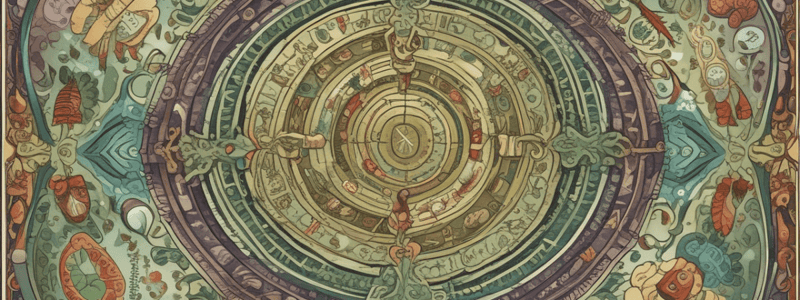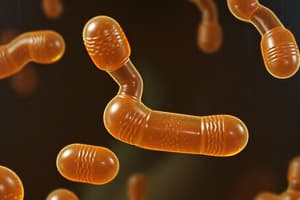Podcast
Questions and Answers
Which of the following botanicals is known for its potent immune-stimulating, anti-microbial, and anti-inflammatory properties?
Which of the following botanicals is known for its potent immune-stimulating, anti-microbial, and anti-inflammatory properties?
- Andrographolide (correct)
- Boswellia extract
- Curcumin
- Quercetin
What is the main mechanism of action of curcumin and Boswellia extract in supporting a healthy cytokine response?
What is the main mechanism of action of curcumin and Boswellia extract in supporting a healthy cytokine response?
- Supporting liver function and balancing the immune system
- Inhibiting oral pathogens and biofilm formation
- Combining to produce a more potent effect than either compound alone (correct)
- Modulating inflammatory pathways triggered by infection
Which of the following botanicals is profoundly hepatoprotective and supports liver function while balancing the immune system and systemic inflammatory responses?
Which of the following botanicals is profoundly hepatoprotective and supports liver function while balancing the immune system and systemic inflammatory responses?
- Quercetin
- Andrographis
- Milk thistle (correct)
- Propolis
What is the main benefit of quercetin in supporting immune function?
What is the main benefit of quercetin in supporting immune function?
What is the main purpose of Self-emulsifying delivery systems (SEDS) in nutraceutical delivery?
What is the main purpose of Self-emulsifying delivery systems (SEDS) in nutraceutical delivery?
Flashcards are hidden until you start studying
Study Notes
Antibiotic Resistance Crisis
- Two million people in the US acquire antibiotic-resistant infections each year, with the number continuing to rise.
- The dwindling efficacy of pharmaceutical antibiotics has led to a renewed interest in traditional medicinal plants for supporting the body's antimicrobial defenses.
Botanicals with Antimicrobial Activity
- Artemisia annua has potent antimalarial activity and is also effective against various pathogens, including periodontal microbes and Staphylococcus aureus.
- Berberine, found in Berberis species, has potent antimicrobial activity against pathogenic microbes.
- Cinnamon essential oil has antimicrobial activity against Borrelia burgdorferi, H.pylori, Pseudomonas aeruginosa, Staphylococcus aureus, Escherichia coli, and Candida albicans.
- CBD, a phytocannabinoid, is a potent antimicrobial, inhibiting the growth of Staphylococcus aureus and Streptococcus pneumoniae with a potency similar to vancomycin and daptomycin.
Botanicals Modulating Cytokine Response
- Curcuminoids, including curcumin and turmeric essential oils, possess antimicrobial and anti-inflammatory effects.
- Curcumin inhibits the growth of Staphylococcus aureus, E.coli, Salmonella, and Candida, while decreasing pro-inflammatory cytokines.
- Boswellia has antimicrobial activities against Staphylococcus aureus, Streptococcus pneumoniae, E.coli, Klebsiella pneumonia, Pseudomonas aeruginosa, and Proteus vulgaris.
- A combination of curcumin and Boswellia extract is more potent than either compound alone for supporting a healthy cytokine response.
Liver and Mast Cell Support
- Milk thistle is profoundly hepatoprotective, supporting liver function and balancing the immune system and systemic inflammatory responses.
- Quercetin, found in edible plants, helps stabilize mast cells, modulating the body's inflammatory response to immune stressors.
Building a Resilient Internal Terrain
- Andrographis and propolis are rich sources of immunomodulatory compounds that support a healthy internal terrain.
- Andrographolide has potent immune-stimulating, anti-microbial, anti-inflammatory properties.
- Propolis has immunomodulatory, antibacterial, antiviral, and antifungal effects.
SEDS Delivery Technology
- Self-emulsifying delivery systems (SEDS) represent a new frontier in nutraceutical delivery systems.
Studying That Suits You
Use AI to generate personalized quizzes and flashcards to suit your learning preferences.
Related Documents
Description
Explore the growing issue of antibiotic resistance and the potential of traditional medicinal plants in supporting the body's antimicrobial defenses. Learn about the crisis of infectious disease mortality and the search for alternative solutions.



